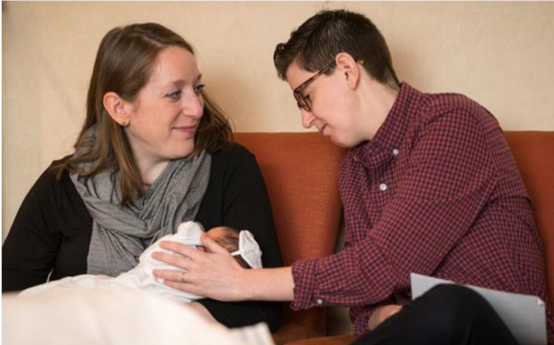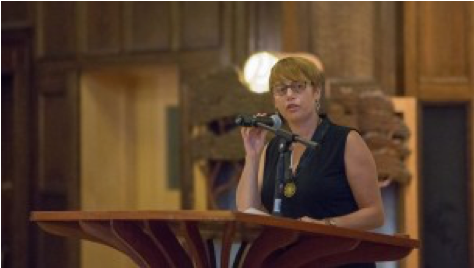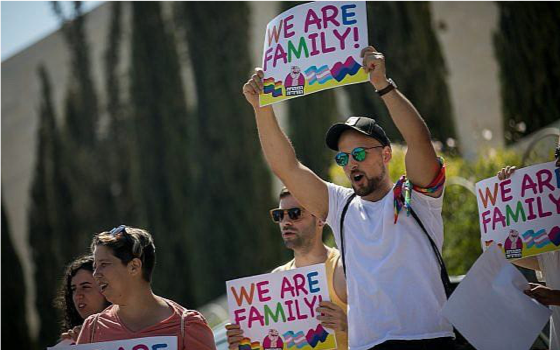
By Cathryn J. Prince


NEW YORK — Becca Israel received two pieces of advice when she and her wife decided to have a baby: read “New Essential Guide to Lesbian Conception, Pregnancy & Birth,” and get a lawyer, because as the non-biological mother she should strongly consider adopting her child.
Since there are few resources for same-sex couples wanting children, she quickly purchased the guidebook. As for the second piece of advice, she filed it away and didn’t officially hire a lawyer until shortly after their son Shai was born.
“I initially felt all the emotions when he was born: the sheer excitement, the disbelief, the anxiety. Then, after a few weeks I reached out to our lawyer to get the process started. And while those emotions remained, they soon gave way to frustration and sadness,” Israel said in a telephone interview with The Times of Israel.
Israel and her wife Hannah Ellenson are both listed as eight-week-old Shai’s parents on his birth certificate. However, as the non-birthing and non-biological parent, Israel must go through a second- parent adoption to fully protect her parental rights.
“I think there is this feeling of heartbreak and sadness. Same sex marriage might be legal, but there are still a significant amount of inequalities,” said Israel, a development officer at Bend the Arc: Jewish Action. She recently wrote about her situation in a piece, “The Nightmare of Having to Adopt Your Own Child” for The Forward.
Family law experts said second-parent adoption is advised for anyone using assisted reproduction — regardless of sexual or gender orientation — but it is most common among LGBTQ parents. For couples such as Israel and Ellenson, it’s become an example of how family law seems to single out LGBTQ people and hasn’t caught up with the myriad ways in which families are formed.
“Legal equality hasn’t yet translated into social equality. The law has limited effect on human behavior. In a time of crisis, say you have a sick child in the hospital, the last thing you want to do is to be defending your status as parent to your child. The legal reality is new and has not fully taken root in social reality,” said Idit Klein, executive director for Keshet, which advocates for LGBTQ equality and inclusion in the Jewish community.

The rights and responsibilities that must be applied for include the ability to make or jointly share in medical decisions, the right to visit your child in the hospital, and automatic custody rights if the other parent dies or becomes incapacitated.
Additionally, they ensure a child receives financial support from both parents; health or other insurance benefits from both parents; and Social Security, retirement or state workers’ compensation benefits if either parent dies or becomes incapacitated.
Robin Fleischner, the New York City-based adoption attorney who represents Israel and Ellenson, has spent her career helping form families through adoption, surrogacy and assisted reproduction. She explained that second-parent adoption in the LGBTQ community is linked to the 2015 Supreme Court 5- 4 ruling in Obergefell v. Hodges, which legalized same-sex marriage.
In writing for the majority, Justice Anthony Kennedy said denying marriage equality had an adverse effect on children born to those couples.
Kennedy wrote: “A third basis for protecting the right to marry is that it safeguards children and families and thus draws meaning from related rights of childrearing, procreation, and education… as all parties agree, many same-sex couples provide loving and nurturing homes to their children, whether biological or adopted.”
Following the ruling, all 50 states were required to put the names of both parents on birth certificates.
“That was huge. However, birth certificates don’t irrefutably establish parenthood. You can disprove it biologically. An order of adoption is an order of parentage. It is not rebuttable,” Fleischner said. “If you move from a blue state to a red state your order of adoption is not challengeable. That’s why the non- biological parent must adopt. Gay rights are still very fragile, believe it or not.”

Fourteen states, including New York, allow second-parent adoption. However, the process differs in each state, according to the National Center for Lesbian Rights. In Massachusetts, for example, lawyers can make a motion for the court to waive the home visit.
In New York, where Israel lives, the state requires those going through a second-parent adoption to be fingerprinted, list every previous address, mandates a home visit with a social worker, a criminal background check, and the adopting parent must ultimately stand before a judge.
Israel finds the process both dispiriting and daunting.
“It just feels like I’m being put under a microscope,” Israel said.
Keshet’s Klein and her wife went through a second-parent adoption three-and-a-half years ago when their son was born. And while Klein understands the legal need, there remains an indignity in the requirement for this legal validation. As such, Keshet is working to educate those in the Jewish community about the many different forms a family can take.
“We work with day schools, synagogues and JCCs to raise awareness. That if you see two parents with a child, regardless of the parents’ gender, to see them as a family. To realize the biology of how they came to be a family is irrelevant,” Klein said.
Deborah Wald, a San Francisco-based family law specialist who serves on the advisory committee for the National Center for Lesbian Rights, said she has a lot of empathy for how it must feel to have to adopt one’s own child. Still, people should understand second-parent adoption isn’t discriminatory, Wald said.
“The laws are not homophobic. They were pioneered by LGBTQ advocates in the legal community to make sure our families are protected. We fought for those laws. The laws are neutral, it’s the application of the laws that are not neutral and that’s what hurts,” Wald said.
Wald doesn’t only counsel her clients who are in same-sex partnerships and marriages to go through second-parent adoption. She makes the same recommendation for heterosexual couples using donated eggs. However, in some states, heterosexual couples using donor sperm in artificial insemination don’t need to go through second-parent adoption.
Ellenson said she and Israel feel it’s important to be vocal about the issue because even though gay marriage is now legal nationwide, LGBTQ couples that want children still face greater societal challenges.
“I really feel it’s an area of the law that hasn’t caught up yet. It’s not purposefully homophobic, but it’s surprising to me that when gay marriage passed it wasn’t thought of. The decision was all about families and I would’ve thought this situation would have been remedied,” Ellenson said.